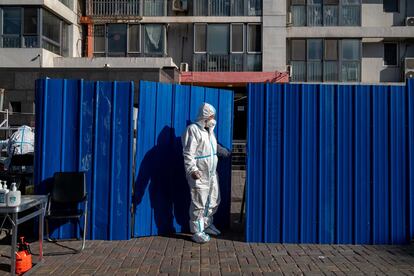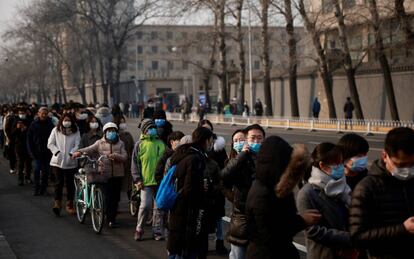Beijing rolls out inhaled vaccine during its biggest Covid surge ever
Approved as a booster, the CanSino drug is another tool in the country’s ongoing battle against the coronavirus


Amid the worst Covid surge to hit Beijing since the start of the pandemic, the city is offering residents a new inhaled vaccine, the first of its kind according to local press reports. Chinese public health authorities approved the booster drug in September for emergency use by adults over the age of 18. It has been available in Shanghai since the end of October, and is also used in a handful of other Chinese cities. The inhaled vaccine was rolled out in Beijing last week, where the daily number of infections continues to climb since the 20th National Congress of the Chinese Communist Party ended in late October. Many housing blocks have been locked down, and schools, stores and restaurants have been closed in some city districts.
The whitish vaccine mist is contained in a plastic cylinder with a straw through which it is inhaled and held in the lungs for five seconds. “The taste is quite good,” said one Beijing resident interviewed by the state-owned CCTV television broadcaster. “It’s a little sweet and fragrant. It doesn’t make you gag” he added. Another recent user told Hong Kong’s South China Morning Post: “It’s like drinking a cup of milk.”
The drug was developed by CanSino Biologics, a Chinese company based in Tianjin that developed one of the injected coronavirus vaccines already in use. The inhaled drug is similar to the injected form of the vaccine in that it uses a common cold adenovirus vector to introduce coronavirus genetic information into human cells. Unreviewed studies published in The Lancet in January indicate that Convidecia AirTM, as the vaccine is called, may be effective as a booster. CanSino’s Condvidecia injectable has been approved for use in more than a dozen countries, including Hungary, Argentina, Mexico and Pakistan, according to the Associated Press news agency. The inhaled vaccine will only be administered to adults who have received two injections of an inactivated vaccine or one injection of CanSino’s adenovirus vector-based vaccine, according to China’s official Global Times daily newspaper.
Beijing is hoping the inhaled vaccine rollout will help revive stagnant booster numbers amid a surge of coronavirus infections that recently reached 28,000 new cases. Covid boosters have been available in China since mid-2021, and 890 million have been administered to 63% of the population, according to official data from early November. Despite being the most vulnerable population, only 40% of people over 80 in China have received a booster, compared to 84.5% of those over 60 in the European Union.
China does not offer any messenger RNA vaccines, considered more effective than inactivated virus or adenovirus vaccines. During German Chancellor Olaf Scholz’s controversial visit to Beijing in early November, he managed to extract a tepid commitment from Chinese authorities to evaluate the Pfizer-BioNTech vaccine for expatriates living in China. Scholtz said he was confident that this was a first step towards wider approval, although other European diplomatic sources remain skeptical.
China is one of the few countries in the world and the only major power still clinging to a strict zero Covid strategy that involves mass testing, total or partial lockdowns of cities when the first few cases are detected, and rigorous technology-driven case and contact tracing that seem like something out of a science fiction movie.

Beijing records first China Covid deaths in six months
A dark cloud hangs over Beijing these days – all anyone talks about is Covid and its daily toll. The megacity of 21 million people now has more than 1,400 new cases every day, the highest daily number ever, and just reported China’s first three Covid-related deaths in the last six months. Before that, the most recent fatality occurred on May 26 in Shanghai during a surge that ripped through the financial metropolis and closed it down for more than two months. Chinese press reports say that the three who recently died in Beijing were between 87 and 91 years old and all suffered from pre-existing conditions.
“The city is facing the most complex and serious prevention and control challenge since the initial coronavirus outbreak,” said Liu Xiaofeng, deputy director of the Beijing Municipal Center for Disease Control and Prevention, in a public statement reported by Reuters. The outbreak is concentrated in Chaoyang, a district with many foreign embassies and office buildings, and home to about 3.5 million people.
China seems to travelling through uncharted territory as it tries to balance its “dynamic” zero Covid policy and the progressive easing of restrictions it euphemistically calls “optimization.” In mid-November, the government approved a number of Covid-related measures including relaxing quarantine requirements for international travelers and those who have had close contact with an infected person. During the presentation of these new measures, Chang Jile, deputy director of the National Administration for Disease Control and Prevention, stressed the need to “accelerate” immunization and booster shots, especially among the elderly. “They are the ones who need it the most,” he said, and called on them to get vaccinated and disregard “internet rumors and disinformation.”
It’s not clear how this Covid balancing act will be influenced by President Xi Jinping’s attendance of the G-20 summit in Bali and the Asia-Pacific Economic Cooperation summit in Bangkok, where he met with dozens of world leaders without wearing a mask. John Lee, head of the Hong Kong government, tested positive for Covid after attending the summit in Bangkok, where he was seated next to Xi. Neither one was wearing a mask. The Chinese leader didn’t leave the country throughout most of the pandemic and only recently began to travel abroad. His attendance at the two summits followed a September visit to Kazakhstan and Uzbekistan where he met with Russian President Vladimir Putin.
Sign up for our weekly newsletter to get more English-language news coverage from EL PAÍS USA Edition
Tu suscripción se está usando en otro dispositivo
¿Quieres añadir otro usuario a tu suscripción?
Si continúas leyendo en este dispositivo, no se podrá leer en el otro.
FlechaTu suscripción se está usando en otro dispositivo y solo puedes acceder a EL PAÍS desde un dispositivo a la vez.
Si quieres compartir tu cuenta, cambia tu suscripción a la modalidad Premium, así podrás añadir otro usuario. Cada uno accederá con su propia cuenta de email, lo que os permitirá personalizar vuestra experiencia en EL PAÍS.
¿Tienes una suscripción de empresa? Accede aquí para contratar más cuentas.
En el caso de no saber quién está usando tu cuenta, te recomendamos cambiar tu contraseña aquí.
Si decides continuar compartiendo tu cuenta, este mensaje se mostrará en tu dispositivo y en el de la otra persona que está usando tu cuenta de forma indefinida, afectando a tu experiencia de lectura. Puedes consultar aquí los términos y condiciones de la suscripción digital.








































